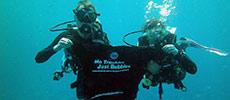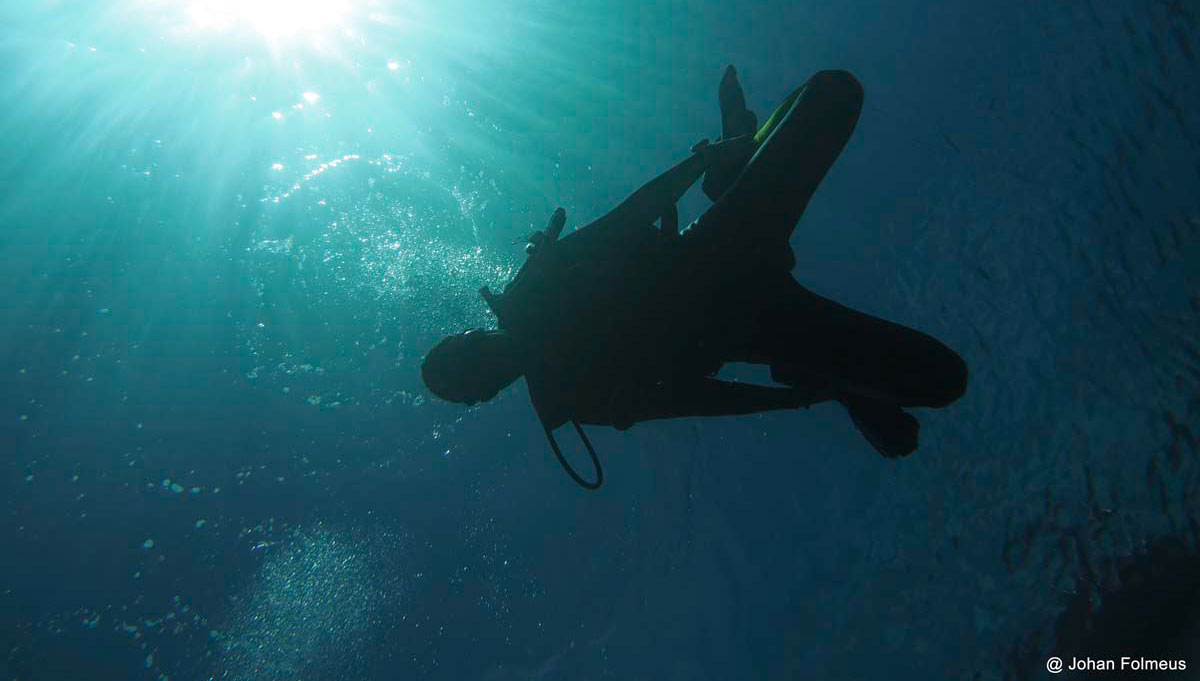 Being land-based mammals, we are not designed to breathe underwater. Scuba diving is an adventure sport that enables us to explore reefs, wrecks, caves and more. Usually the main thing that limits our time and enjoyment underwater is how much air we have left in our tanks. Most experienced divers can manage air consumption well enough that other factors limit their dives. However, new and inexperienced scuba divers tend to use most of the air in their tank for each dive, and this is the main limiting factor on the time they can stay underwater. In this article, you can read about a number of factors which affect air consumption, and a few ways to help you improve. Some of the things we can do nothing about, and some are dependent on others, but most of the ways to improve can easily be achieved by you - the diver.
Being land-based mammals, we are not designed to breathe underwater. Scuba diving is an adventure sport that enables us to explore reefs, wrecks, caves and more. Usually the main thing that limits our time and enjoyment underwater is how much air we have left in our tanks. Most experienced divers can manage air consumption well enough that other factors limit their dives. However, new and inexperienced scuba divers tend to use most of the air in their tank for each dive, and this is the main limiting factor on the time they can stay underwater. In this article, you can read about a number of factors which affect air consumption, and a few ways to help you improve. Some of the things we can do nothing about, and some are dependent on others, but most of the ways to improve can easily be achieved by you - the diver.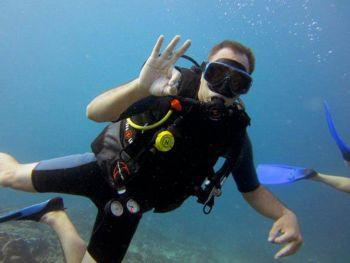
Before reading, please note that on every dive, there is a safety buffer/margin that divers have to enable a safe and complete dive. Running out of air while underwater is very rare, dangerous, and irresponsible. It is also important to understand that being competitive about having more air left at the end of your dive than others doesn’t mean you are a better diver. Although more experienced divers use less air than newer divers, there are many other factors to consider.
- What can I do to make my air last longer?
- Which factors are affected by others?
- What are the things I can do nothing about?
By far the most common factors that affect your air consumption are how you behave underwater, but also include what you do before you even get on the boat. You can improve your air consumption while underwater in a number of ways, and these include what you do with your body as well as what is going through your mind.
Before you dive
Have a good night’s sleep, and try not to drink too much alcohol. Of course, you should never drink before diving, but it’s quite common for scuba-diving tourists to enjoy drinks in the evening the night before a diving trip. Well-rested and healthy divers are more likely to relax and enjoy the dive, and this directly affects how much air they consume during the dive. However, what they do and think about during each dive is much more important.
What to do, and not do, while underwater
 This section is the most important, and includes things that you can and should focus on every time you go scuba diving. It includes breathing, your arms, and your legs. Obviously, the thing that causes your air supply to run out is your breathing, but there are a few other things which make huge differences. Number 1, though is simply breathing. Try your best to relax and breathe normally. In fact, if you can try to breathe like you do when you sleep, that’s perfect. Slow, relatively-deep and even breaths are the best, and anyone thinking that shallow breaths or holding your breath will help is completely wrong. We will discuss a few other things that affect your breathing a little later on. Swimmers need to use their arms to propel themselves through the water, but scuba divers do not, and should not. Watch your Divemaster guide or instructor. He or she will only use their arms to communicate. The rest of the time the arms are often folded. Therefore, never wave your arms around, and don’t use them to swim along. Using your arms is a waste of energy, and using that energy will only speed up the rate of your air consumption. Ok, sometimes a hand can be used to help you change direction when you’re stationary, but in general you don’t need your arms, so keep them out of the way. Your legs are what propel you through the water, and change direction. Larger fins are more effective than smaller fins. For propulsion, you can do regular alternate up & down fin strokes, or like a frog. Like waving your arms, finning uses energy and consumes your air. Try not to fin too much, and certainly do not race around the reef. Go as slowly as possible and use as little energy as you can. A lazy diver not only uses less air (giving a longer dive) he or she will have more time to see things that others may miss. Slow down, chill out, and don’t waste energy moving your limbs unless you have to.
This section is the most important, and includes things that you can and should focus on every time you go scuba diving. It includes breathing, your arms, and your legs. Obviously, the thing that causes your air supply to run out is your breathing, but there are a few other things which make huge differences. Number 1, though is simply breathing. Try your best to relax and breathe normally. In fact, if you can try to breathe like you do when you sleep, that’s perfect. Slow, relatively-deep and even breaths are the best, and anyone thinking that shallow breaths or holding your breath will help is completely wrong. We will discuss a few other things that affect your breathing a little later on. Swimmers need to use their arms to propel themselves through the water, but scuba divers do not, and should not. Watch your Divemaster guide or instructor. He or she will only use their arms to communicate. The rest of the time the arms are often folded. Therefore, never wave your arms around, and don’t use them to swim along. Using your arms is a waste of energy, and using that energy will only speed up the rate of your air consumption. Ok, sometimes a hand can be used to help you change direction when you’re stationary, but in general you don’t need your arms, so keep them out of the way. Your legs are what propel you through the water, and change direction. Larger fins are more effective than smaller fins. For propulsion, you can do regular alternate up & down fin strokes, or like a frog. Like waving your arms, finning uses energy and consumes your air. Try not to fin too much, and certainly do not race around the reef. Go as slowly as possible and use as little energy as you can. A lazy diver not only uses less air (giving a longer dive) he or she will have more time to see things that others may miss. Slow down, chill out, and don’t waste energy moving your limbs unless you have to.
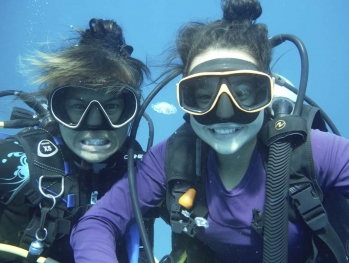 Watch your dive guide and try to copy them. They nearly always keep their arms in or folded. They usually use frog-like fin kicks, and kick smoothly and not often. Don't worry about things, and relax as much as you can.
Watch your dive guide and try to copy them. They nearly always keep their arms in or folded. They usually use frog-like fin kicks, and kick smoothly and not often. Don't worry about things, and relax as much as you can.
Psychological factors make a huge difference: To some it may seem a bit crazy, but what is going on in a scuba diver’s mind makes a huge difference to how much air he or she is consuming. A mentally-relaxed diver will use much less air than one who is nervous, excited, or worried. A diver who is worried about air consumption will use more air worrying due to their state of mind affecting the heart rate. Worrying about anything including currents, the amount of air left in the tank, your buddy, or a particular creature or hazard underwater will only make you breathe harder and faster. Being too blasé is maybe not ideal, because there are certain risks when scuba diving, but all the time you are in the care of a trained professional you should be fine. So, chill out and enjoy the dive.
Also, your 'trim' is the term used in diving referred to your position in the water. Divers should remain in a horizontal position as often as possible, and stay streamlined. Hoses and gauges hanging down are not only going to affect your air consumption through lack of streamlining, they're also a potential hazard for getting trapped in the reef!
There are also a few things that other people may be responsible for which can affect how much air you use while on a scuba dive, or how long your dive will last for. These are mainly related to the diving equipment which you use, and the behaviour of other divers in your group.
Well-maintained equipment that fits and is set up properly
 Your scuba diving gear is what keeps you alive, and enables you to enjoy the dives. Many divers reading this don’t dive frequently enough to buy their own gear, and will use rental diving equipment from the dive centre. Each item needs to be well maintained so it doesn’t leak, and it must fit you properly. Leaking hoses, joints or gauges will waste air without you being able to do anything about it. It needs to be set up on the diver to reduce drag when underwater, because unnecessary drag causes the diver to use more energy. Also, the equipment needs to include the correct amount of weights. Divers who are too heavy (negatively buoyant) will use more air than necessary. Sometimes even worse is to be too buoyant, because the diver is then constantly fighting to stay down, and that wastes air even more quickly. While some Divemasters and instructors will tell you that neutral buoyancy is perfect, this is technically impossible to achieve throughout the dive. Considering that a perfect dive profile sees a diver start deep and end shallow, and that a reduced amount of air in your tank causes more positive buoyancy, it makes sense to be a little over-weighted (negatively buoyant) at the start of each dive, and that will even out as you proceed. However, balancing this is never easy. Divers tend to soon find out how much weight is perfect for them, and then after every 50 dives they are likely to realise that removing a weight enables them to dive just as easily and safely. Uness your dive guide is fat, he or she will use very little weights to dive. They may carry extra weights just in case their group needs more once in the water, but many of them dive with 2 kilos or less. Being properly weighted is a huge factor to ensure that your air consumption is at its best.
Your scuba diving gear is what keeps you alive, and enables you to enjoy the dives. Many divers reading this don’t dive frequently enough to buy their own gear, and will use rental diving equipment from the dive centre. Each item needs to be well maintained so it doesn’t leak, and it must fit you properly. Leaking hoses, joints or gauges will waste air without you being able to do anything about it. It needs to be set up on the diver to reduce drag when underwater, because unnecessary drag causes the diver to use more energy. Also, the equipment needs to include the correct amount of weights. Divers who are too heavy (negatively buoyant) will use more air than necessary. Sometimes even worse is to be too buoyant, because the diver is then constantly fighting to stay down, and that wastes air even more quickly. While some Divemasters and instructors will tell you that neutral buoyancy is perfect, this is technically impossible to achieve throughout the dive. Considering that a perfect dive profile sees a diver start deep and end shallow, and that a reduced amount of air in your tank causes more positive buoyancy, it makes sense to be a little over-weighted (negatively buoyant) at the start of each dive, and that will even out as you proceed. However, balancing this is never easy. Divers tend to soon find out how much weight is perfect for them, and then after every 50 dives they are likely to realise that removing a weight enables them to dive just as easily and safely. Uness your dive guide is fat, he or she will use very little weights to dive. They may carry extra weights just in case their group needs more once in the water, but many of them dive with 2 kilos or less. Being properly weighted is a huge factor to ensure that your air consumption is at its best.
Finally, things like the size & quality of your fins will affect how much effort you need to put into each dive. A good set of fins can save up to 20% of the energy you may normally waste.
Others’ behaviour
 Although normally the behaviour of other divers in your group only really affects the length of your dive, it can also directly affect how much air you use yourself.
Although normally the behaviour of other divers in your group only really affects the length of your dive, it can also directly affect how much air you use yourself.
Each diving group is normally led by a Divemaster guide, or an instructor. This person is responsible for the safety and enjoyment of everyone in the group, which is normally 2-6 customers. In most cases, one guide is responsible for the whole group, and when one diver gets low on air the whole group need to start to ascend to the surface and end the dive. Sometimes, the dive guide may send two customers to the surface and he or she stays with those who are better on air. There are also times when the dive guide has an assistant who will escort divers to the surface. However, if another diver in your group is behaving in a way that is entertaining, annoying or unsafe, you may consume more air than you normally do. Fooling around is fun, but doing so and laughing at each other will increase how much air you breathe. Also, in extreme cases, if your buddy runs out of air, he or she will need to breathe from your octopus (spare hose) while you both ascend to the surface. This will bring your dive to an end within a couple of minutes.
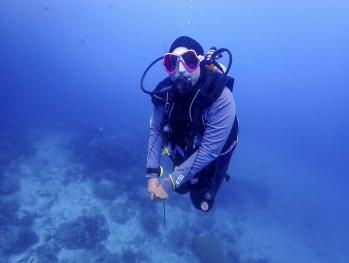 In addition to what has already been mentioned, there are some things which are simple science. These factors will cause one diver to consume more air than another when all other things are equal. These relate to depth, temperature and physiological makeup of the individuals.
In addition to what has already been mentioned, there are some things which are simple science. These factors will cause one diver to consume more air than another when all other things are equal. These relate to depth, temperature and physiological makeup of the individuals.
All certified divers will have learned that the compressed air we breathe when underwater is used up at different rates depending on the depth it is breathed at. Two identical divers at different depths will not consume the same amount of air per breath. The diver who is deeper will use up his or her supply more quickly than the diver who is shallower. This is a scientific fact that cannot be changed.
Also, the temperature of the water, and the diver’s ability to stay warm, will affect how much air is consumed. Those who are cold will use more because mammals feeling the cold will use more energy in an attempt to stay warm. Wetsuits are exactly what their name suggests. They do not keep the diver dry, but they do offer warmth.
Body size & gender
Larger men will have to forget any bravado of claiming to be better than the ladies or smaller guys at a physical sport. This is because larger people have larger lungs, especially males compared to females. A large diver is more likely to have more lung capacity, and therefore needs more air. There is very little you can do about this, other than focus on all the other aspects that affect air consumption in an attempt to counterbalance being large.
Smoking
Smokers benefit, for a change! In the 21st century most people around the world know that smoking is bad for you, and has no real-world benefits. It seems strange that so many scuba diving professionals, such as instructors and Divemasters who are trained to perform CPR and lead healthy active lives, are full-time smokers. This is especially the case in much of South-East Asia, the most popular scuba diving area in the world. Whatever one’s reasons are for smoking, having lungs filled with tar reduces the amount of inhaled air for the lungs to process. Therefore, long-term smokers’ tanks of air will last longer than those of a non-smoker, if all other factors are the same. This is not meant as an encouragement for budding divers to take up smoking. It’s just a physiological fact.
In summary, a little bit of all the aforementioned factors play a part in how much air a diver will consume compared to others. Every dive is different, and we are all unique. Also, it’s not a competition. Divers who end a dive with more air in their tanks are no better off than those who used up more. There is no ‘credit’ or bonus at the end for the diver who used the least air. Diving customers who breathe less don’t pay less than those who use more. The most-important factor that controls air consumption is experience. An experienced diver is likely to be calm, relaxed, and know about what else will affect air consumption, and therefore use less of it than a new, inexperienced or novice diver.
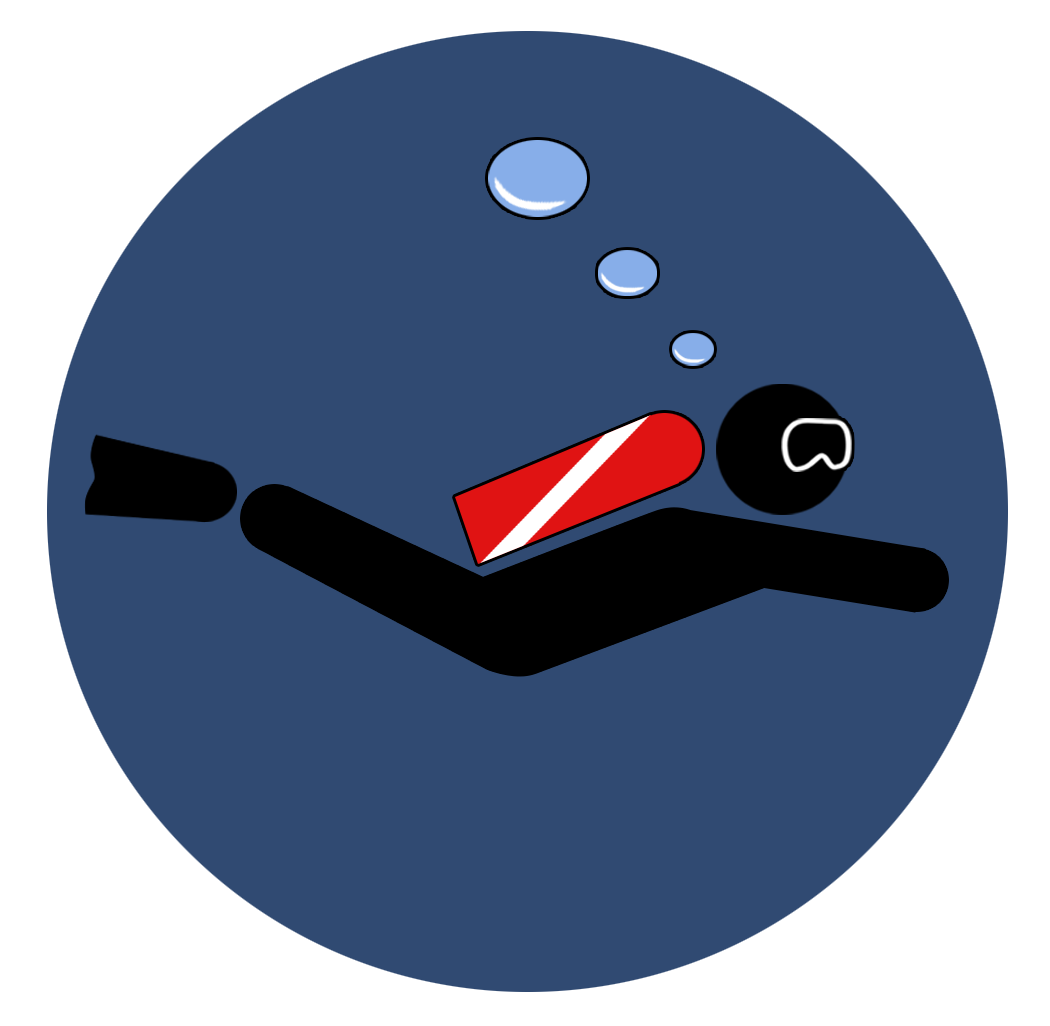
 Like
Quote
Like
Quote

